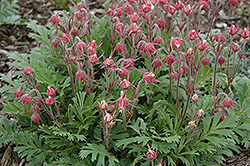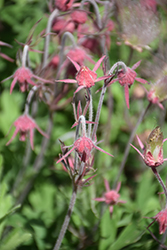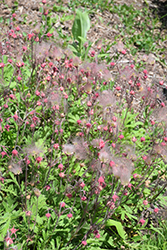Plant Height: 6 inches
Flower Height: 12 inches
Spacing: 10 inches
Sunlight:
![]()
![]()
Hardiness Zone: 2b
Other Names: Three-Flowered Avens
Description:
Unusual and interesting rose colored, nodding bowl shaped flowers rise above green fern-like foliage; flowers followed by interesting seed heads resembling feathery plumes; drought tolerant, great for use in borders, containers and cottage gardens
Ornamental Features
Prairie Smoke features unusual nodding rose flowers at the ends of the stems from late spring to mid summer. The plum purple fruits are carried on showy plumes displayed in abundance from mid summer to early fall. Its tomentose narrow compound leaves remain green in colour throughout the season.
Landscape Attributes
Prairie Smoke is an herbaceous perennial with an upright spreading habit of growth. Its relatively fine texture sets it apart from other garden plants with less refined foliage.
This plant will require occasional maintenance and upkeep, and should be cut back in late fall in preparation for winter. It is a good choice for attracting butterflies to your yard, but is not particularly attractive to deer who tend to leave it alone in favor of tastier treats. Gardeners should be aware of the following characteristic(s) that may warrant special consideration;
- Spreading
Prairie Smoke is recommended for the following landscape applications;
- Mass Planting
- Rock/Alpine Gardens
- Border Edging
- General Garden Use
- Naturalizing And Woodland Gardens
- Container Planting
Planting & Growing
Prairie Smoke will grow to be only 6 inches tall at maturity extending to 12 inches tall with the flowers, with a spread of 12 inches. When grown in masses or used as a bedding plant, individual plants should be spaced approximately 10 inches apart. Its foliage tends to remain low and dense right to the ground. It grows at a medium rate, and under ideal conditions can be expected to live for approximately 5 years. As an herbaceous perennial, this plant will usually die back to the crown each winter, and will regrow from the base each spring. Be careful not to disturb the crown in late winter when it may not be readily seen!
This plant does best in full sun to partial shade. It prefers dry to average moisture levels with very well-drained soil, and will often die in standing water. It is not particular as to soil pH, but grows best in sandy soils. It is somewhat tolerant of urban pollution. This species is native to parts of North America. It can be propagated by division.
Prairie Smoke is a fine choice for the garden, but it is also a good selection for planting in outdoor pots and containers. It is often used as a 'filler' in the 'spiller-thriller-filler' container combination, providing a mass of flowers against which the larger thriller plants stand out. Note that when growing plants in outdoor containers and baskets, they may require more frequent waterings than they would in the yard or garden.
Disclaimer - This resource is provided for informational purposes only and does NOT reflect current availability. Inventory varies seasonally, so we cannot guarantee that every plant will be in stock at all times - please contact your favourite GardenWorks location directly for current availability. It does not include our entire inventory of plants, so be sure to visit GardenWorks to see varieties that may not be represented on this list.



